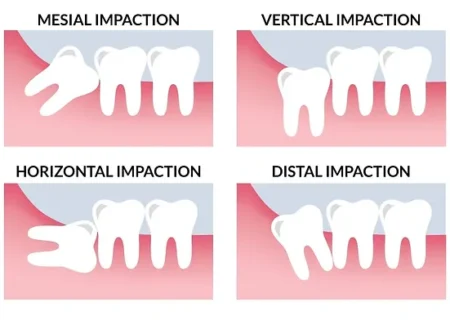Wisdom Tooth Removal
What is wisdom Tooth?
Wisdom teeth, also known as third molars, typically erupt during late teens or early twenties, although they can also appear later in adulthood. While well-aligned and properly erupted wisdom teeth can be beneficial, complications can arise if they do not emerge correctly. Misaligned wisdom teeth may require extraction as they can potentially cause damage to adjacent teeth if left untreated.

Why wisdom tooth need to extracted?
Impacted wisdom teeth occur when they remain partially trapped within the soft tissue or only partially erupt through the gums. This can create several issues:
- Increased Risk of Infection: Partially opened wisdom teeth create an opportunity for bacteria to enter, leading to infection. This can cause swelling in the jaw, pain, and general illness.
- Difficulty in Oral Hygiene: Misaligned wisdom teeth can make it challenging to brush and floss properly, increasing the risk of tooth decay and gum disease in that area.
- Multiple Wisdom Teeth: There are typically four sets of wisdom teeth, two in the upper jaw and two in the lower jaw. However, due to changes in lifestyle and jaw development, some individuals may not develop wisdom teeth at all.
- Dental Hygiene Challenges: Wisdom teeth are often hard to reach, making proper oral hygiene practices difficult. This can result in food and bacteria becoming trapped, leading to tooth decay and gum infections.
- Misalignment problems: Wisdom teeth in the upper jaw can have a tendency to tilt sideways, leading to friction against the cheek. This can result in discomfort, including the development of mouth ulcers and challenges with chewing.
During wisdom tooth removal treatment, dentists assess for pain, damage, crookedness, and signs of infection. Removing impacted wisdom teeth helps minimize their impact and prevents potential future problems.
Symptoms to get Wisdom tooth removed
Symptoms associated with problematic wisdom teeth include:
- Pain and Swelling: Discomfort and swelling around the wisdom tooth area, which can worsen over time.
- Red, Inflamed Gum: The gum tissue surrounding the wisdom tooth may become red and inflamed, indicating irritation or infection.
- Pus Discharge: Pus may be present, coming from the gum near the wisdom tooth. This is a sign of infection and requires attention from a dentist.
- Radiating Pain: The pain from problematic wisdom teeth can radiate to the head and ear region, causing additional discomfort.
- Difficulty in Eating: Pain or discomfort while chewing or biting down can make eating challenging, especially if the wisdom tooth is causing irritation or impeding proper oral function.
- Foul Breath and Bad Taste: Wisdom teeth that are impacted or infected can lead to a foul odor or taste in the mouth, which can be noticeable even after brushing or using mouthwash.
- Jaw Pain and Stiffness: Misaligned or impacted wisdom teeth can cause jaw pain and stiffness, affecting the overall function and mobility of the jaw joint.
It is important to consult a dentist if you experience any of these symptoms, as they may indicate issues with your wisdom teeth that require treatment.




